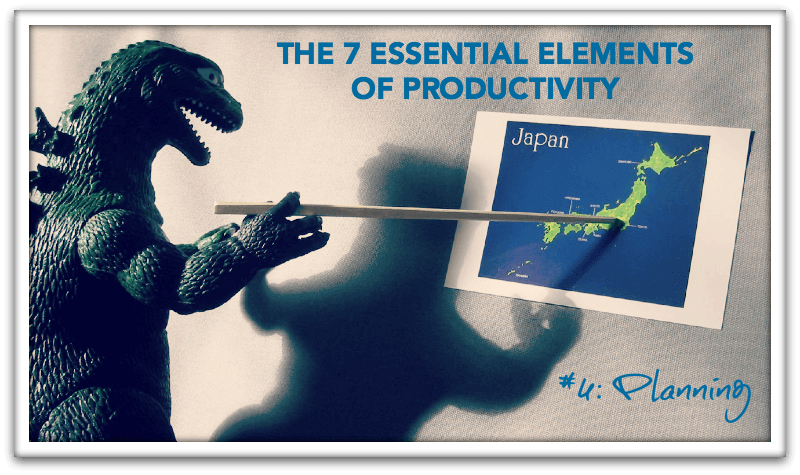The 7 Essential Elements of Productivity
Element #4: Planning
This is the fourth article in the series: The 7 Essential Elements of Productivity. Read the other articles here.
We all have a lot to learn from Godzilla. To be incredibly productive (and achieve our goal of world domination), we need a plan. But, not just any plan. We need the absolute best, most thorough plan we have ever seen.

Photo Credit: WorldIslandInfo.com
Planning is dicey. On the one hand, we all need to do it. On the other, the planning process can consume a huge chunk of our time if we’re not careful.
In order to maximize our ability to get the most done, we have to learn how to plan with three critical ingredients.
The Three Critical Ingredients of Planning
Over the years I have come to the realization that these three ingredients are not only critical, they are necessary if you want to truly optimize your time.
Knowing how to plan well is one of the most important processes for any productivity junkie.
1. Use the Tools that Make Sense to You
Just walking through a Staples store can give anyone a panic attack. There are hundreds, if not thousands, of different planners, calendars, and scheduling systems. I can’t imagine trying to find the perfect system by simply gawking at the wall of day planners.
Fortunately, finding tools that make sense to you doesn’t have to be so daunting. Let me save you the trouble and recommend two of the best options. Feel free to disagree with me, but if you are in need of a new system and are looking for a place to start, this is what I recommend.
Paper Planner: Franklin Covey Day Planner
Franklin Covey is one of the most well-known brands in the world of planners and the Classic Franklin Covey Day Planner is a great place to start if you want a comprehensive view over your upcoming week.
I used a paper planner throughout most of my college years and what I miss the most was having the luxury to physically interact with my calendar, especially scratching off tasks once they were accomplished.
Digital Planner: Nozbe + Google Calendar
I now use and highly recommend Nozbe for a GTD-based software solution to task management and planning. This is the only system I have tried that encompasses all of the best elements of GTD while also not being too clunky to use.
I also use Google Calendar to get the visual of my weekly schedule. Nozbe can synchronize with Google Calendar so you can see your upcoming week in the tradition calendar view.
Experiment, Experiment, Experiment
Though I certainly can recommend my favorite tools that work for me, finding the ones that work for you will take a little time. Be ready to try new types of planners and software until you land on one that works really well.
However, I will warn you that no system will ever be perfect. If you go on a hunt to find the “ideal” custom solution that fits your life beautifully, you could end up looking forever.
2. Plan Time for Planning
I frequently refer to my Weekly Review process as the gold standard for my productivity. It is the core of my system as it encompasses the full planning process on a consistent basis.
If you take any advice from me, take this one: add a weekly review process to your calendar and stick to it. It only takes 1-2 hours at the most and it can revolutionize how you manage your time, activities, deadlines, and commitments.
During a weekly review you will review these core elements:
- Ideal Week: Review what an ideal week would look like if everything went as planned. Ask yourself, “How could this week coming up look more like my ideal week?“
- Daily Rituals. Review which habits you are monitoring on a daily and weekly basis. Make sure you are on track. If not, find a solution to get back on track next week.
- Accountability Goals. If you have an accountability partner, which I highly recommend, you will be able to review your goals with that person each week.
- Weekly Reflection. Part of my weekly review process is filling out a reflection document, which forces me to dip deep and analyze how my last week went. This process helps immensely with planning my upcoming week.
- Review of ALL tasks. In your task manager or paper planner, make sure you review every single task, event, deadline, and commitment that is coming up in the next 7-10 days. This is your chance to prepare in advance.
Learn more about how to start your own weekly review.
3. Always Focus on Action
The plans that ultimately deliver the outcomes we are looking for are thorough, meaning they are well-thought out, specific, and highly actionable. The GTD (Getting Things Done) model from David Allen bases task management and planning on the adherence to energy, time, priority, and location.
In other words, the best plan acknowledges that all four of these characteristics should be considered for every task, every time.
Let’s use an example of planning to exercise tomorrow morning:
- Energy: will you be awake, alert, and energized enough to have a great workout?
- Time: will you have enough time blocked off for getting dressed, driving to the gym or park, warming up, working out, cooling down, driving back home, showering, and every other step in the process?
- Priority: is working out a priority for you? In other words, will exercising significantly help you achieve one or more of your current goals?
- Location: have you planned where you will be when you exercising? At home? The gym? The park?
The best plans always require a lot of brain power because in order to effectively overcome all of the potential obstacles you have to ask yourself a lot of questions.
Don’t worry though, for most tasks (especially the ones you repeat over and over), you will likely only have to ask these questions once. After that, you can simply follow your well-planned, efficient, and effective system.
Action Steps
- If you don’t already have a planning system, task manager, or calendar, this is the time to get one that makes sense to you, your current projects, and your future goals. I use only digital tools (like Nozbe and Google Calendar), but paper planners can be just as effective.
- Schedule 1-2 hours per week for your Weekly Review. This is the gold standard for consistent productivity.
- Your planning sessions should result in baby step actions. Make sure you have broken down your big goals into tiny, specific, and actionable pieces.
Next Week
Next week on the blog I will be sharing the third essential element of productivity.








